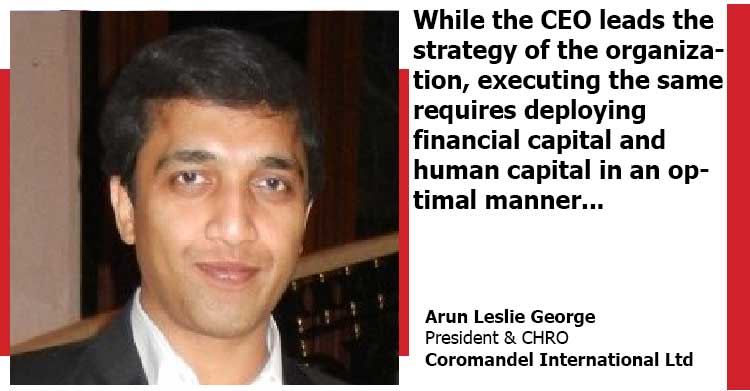The CHRO and the CFO need to work together to achieve a common organisational goal | Arun Leslie George | President & CHRO | Coromandel International Ltd

How crucial is the Relationship between the CHRO and the CFO?
While the CEO leads the strategy of the organization, executing the same requires deploying financial capital and human capital in an optimal manner. The CFO supports the CEO by raising, allocating and monitoring financial resources. The CHRO on the other hand works with the CEO by building talent and creating a culture which supports strategy. To achieve the organization’s objectives it is imperative that the CHRO and CFO work together closely. A strong CHRO-CFO partnership will result in better financial results, better employee engagement and a better organizational culture.
Financial Capital is predictable while Human Capital is unpredictable and the approach to managing these two types of capital is very different. While they may be different, they need to co-exist. A good relationship between the CHRO and CFO can lead to a synergistic bond for these two important forms of organizational capital.
In today’s fast growing environment, it is imperative that the organisation is agile in responding to and anticipating changes. The closer CHROs and CFO’s work together, the more agile their organisations can be in identifying and identifying strategic opportunities. Quick response to allocation of human and financial
resources is essential to respond to changes in customer requirements and that of competition. Hence the more closer that CHRO’s and CFO’s work together the greater the competitive advantage for the organisation.
Are they equal partners in achieving organizational goals?
Yes, they are equal partners in achieving organizational goals as they have the responsibility for the most important forms of capital in an organization – financial capital and human capital. Neither strategy formulation nor execution is possible without either of these. Every strategic choice has an implication on financial capital and human capital; the intertwining of the same is an opportunity for competitive edge for the organisation.
If either the CHRO or the CFO believes that they are more important than the other and do not value the other person’s time and capabilities then the relationship is heading towards failure. To build the relationship between the CFO and the CHRO, they must comprehend each other’s work and capabilities. Any kind of competition and one-upmanship will prove to be disruptive and lead to a politically charged atmosphere.
There will be occasions where one of them will have a more important role to play but in the larger scheme of things they should consider each other as equal partners.
Can they collaborate effectively to meet organizational objectives?
The insights of the CHRO and CFO are unique due to their roles, interactions with various stakeholders and the knowledge & information they possess. Sharing these insights and working on the same together can create tremendous value for the organization.
While it may seem obvious that the CHRO and CFO must work together, in the day-to-day working there will emerge several differences as their primary stakeholders are different. These differences are exacerbated by the tension between short and long-term targets. It is in this context the CHRO and CFO need to work together to ensure there is balance between the interests of various stakeholders and towards a common organisational goal.
An effective way to collaborate is to put the CHRO and CFO in a team to work on a specific and common goal. This not only serves to iron out the differences but over time creates a mutual respect for the other function. Similar actions down the line will create an organization where HR and Finance functions work together
synergistically. It will also create an environment of trust and understanding.


